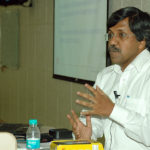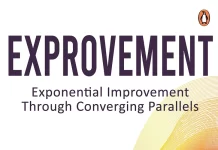India needs to invest much more on research if it is to make notable contribution to finding solutions for complex sustainability related problems. The current investments in Indian research are inadequate and stagnating resulting in a corresponding stagnation of India’s research output and quality, Michiel Kolman, senior VP at Elsevier, told SustainabilityNext. Although the quality of research is getting better, there is a clear need for Indian researchers to write collaborative international papers, he added.
Mr. Kolman was in India recently to take a peek at India’s research landscape and how it can move forward to achieve its scientific and sustainability goals. In his global role, Michiel has advised government agencies and academic institutions on how best to build research excellence. The Amsterdam-headquartered $2.36 (GBP) billion company, founded in 1880, has a strong presence in India especially in medical journal and book publishing.
“We see a clear correlation that the more you publish internationally with other countries the higher the impact of your research. And India is at the bottom four, with relatively low international co-authorship. India should publish more, internationally co-authored articles,” he said. He said there is a big opportunity for India to recalibrate its academic priorities and focus for building a sustainable future.
However, he complimented India on doing better on disaster science research. In terms of citation impact, with 1 as world average, China is at 0.9, below world average, while India is at 2.14, well above the world average. India is one of the top five countries on research output on earthquakes, droughts, tsunamis, floods and landslides.
Elsevier launched Health Care Reforms in India: Making Up for the Lost Decade, a look at India’s  healthcare system by Rajendra Pratap Gupta in February 2016. The book documents the development of India’s health care sector over the last 65 years and makes the case for political priority and policies for universal healthcare coverage as well as an upstream pre-emptive approach to health through technology deployment and enablement.
healthcare system by Rajendra Pratap Gupta in February 2016. The book documents the development of India’s health care sector over the last 65 years and makes the case for political priority and policies for universal healthcare coverage as well as an upstream pre-emptive approach to health through technology deployment and enablement.
In his review, Dr. Devi Shetty,Chairman, Narayana Health, said “I always felt that India will become the first country in the world to dissociate health care from affluence. Rajendra has shown why it will happen and how it will happen and to some extent, when it will happen. The book makes a profoundly interesting reading with overwhelming data to prove that, for the stability of the society, we need to develop robust health care system with equal participation by the government, private and NGO sectors.”
Why Sustainability Science?
Sustainability Science’ as a sub-field of Sustainability is about two decades old. Harvard University was a pioneer when it started the Sustainability Science Program in 2000. Its focus has been to drive research, teaching, and interventions on the challenges of sustainable development by fostering shared prosperity and reduced poverty while protecting the environment. The Program also promotes the design of institutions, policies, and practices that support sustainable development.
SS is essentially advancing scientific understanding of human-environment systems; Improving connections between research and policy communities; and Building capacity for linking knowledge with action to promote sustainability.
SS’ approach is multidisciplinary, engaging people from the natural, social, health and engineering sciences, and from practical field experience in business, government, and civil society.
The 15 UN Sustainability Development Goals has given Elsevier, a global information and analytics firm, an opportunity to present recent trends in SS research globally, including India. It released its first series of insights into the global research landscape in collaboration with SciDev.Net. The report“contributes to the understanding of sustainability science as a research field and the dialogue between science and society in sustainable development.”
Core findings
- Sustainability science is a field with a high growth rate
In 2009 the total research output of the field was 56,390 and this increased to 75,602 in 2013. This results in a compound annual growth rate (CAGR) of 7.6%, almost twice the average growth rate of all publications in Scopus over the same period. India’s publications in Sustainability Science are growing very fast, 18.2% annually.
- Research output in sustainability science attracts 30% more citations than
an average research paper
The FWCI of publications in sustainability science in the period 2009-2013 is 1.3 – 30% higher than the world average of 1. The theme Planet leads all other themes in FWCI. Throughout the period it remains stable at around 1.50.
- Research in sustainability science is highly collaborative and international
As an example, the USA’s proportion of international collaboration increased from 26.5% of its research output in this field to 32.9%. For countries such as the UK and Germany, around half of their publications in sustainability science are joint efforts by researchers from different countries. Many countries, in particular China and Japan, collaborate much more intensively in sustainability science than overall. However, the level of collaboration between developed and developing countries in sustainability science is still low.
- Sustainability science is less interdisciplinary than the world average
On average, 6.7% of sustainability science publications in the period 2009-2013 belong to
the world’s top 10% most IDR publications. This number is lower than the world average of 10%. However, the percentage is growing. Across the world, we see an increase from
6.1% to 7.1%.
IDR research in sustainability science focuses on a number of topics. They include health and pollution, water and its social and economic implications, and the economic and environmental impact of energy and fuels.
Download the report (https://www.elsevier.com/research-intelligence/research initiatives/sustainability-2015).

Break Disciplinary Silos
Prof. P D Jose, who teaches Sustainability and Strategy at IIM Bangalore, thinks that top Indian academic and science institutions still work in silos. He believes that it is high time platforms or networks of Indian institutions are set up so that resources are pooled to address common problems. They would be in a better position to assist policy makers if they are able to provide lasting and economically viable solutions to problems facing cities and rural areas.
More than anything he feels that new and disruptive innovations are possible in this sector when diverse disciplines come together to tackle challenging sustainability problems and break the disciplinary silos that pigeonhole academics and academic research.










